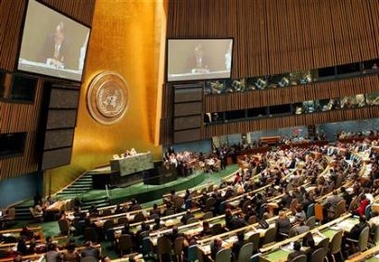Top News
UN approves counter-terrorism plan
(Reuters)
Updated: 2006-09-09 11:55
 |
Large Medium Small |
Israeli and Arab diplomats feuded bitterly after the United Nations approved a largely symbolic global plan to combat terrorism three days before the fifth anniversary of the September 11 attacks.
 The General Assembly of the United Nations meets at U.N. headquarters in New York May 9, 2006. Israeli and Arab diplomats feuded bitterly on the U.N. General Assembly floor on Friday after the United Nations approved a largely symbolic global plan to combat terrorism three days before the fifth anniversary of the September 11 attacks. [Reuters] |
The counter-terrorism "plan of action," approved by the 192-nation assembly without a formal vote, laid out eight pages of broad goals and measures to prevent terrorist acts, address the conditions that may foster terrorism and help nations build up their capabilities while respecting human rights.
But nine counties, mostly Arab nations, took the floor after its adoption to complain that it did not target Israeli military actions in Lebanon and the Palestinian territories.
Nor did it shield groups such as the Palestinians from being tagged as terrorists for pursuing "national liberation movements," the envoys said.
That prompted Israeli criticism of Iran and Syria for failing to crack down on attacks against the Jewish state.
Adoption of the counter-terrorism strategy followed a year of wrangling over the plan's details after a world summit in New York directed the United Nations to prepare a plan.
The document glossed over some of the controversies that have plagued UN efforts to fight terrorism for years.
UN members thought they had figured out a way around one impasse when Secretary-General Kofi Annan suggested, in place of a formal definition of terrorism, a simple statement branding as terrorism any intentional maiming or killing of civilians, regardless of its motives.
While members agreed to the plan's adoption, the barbs began flying when delegates were given the chance to comment.
"It is an extremely sensitive subject, a very emotional issue, and rightly so," General Assembly President Jan Eliasson told reporters following the bitter exchanges. "But since this is a global menace, we must have a global approach."
Annan, for his part, called it a "historic achievement" and urged nations to honor "the victims of terrorism everywhere by taking swift action to implement all aspects of the strategy."
Assembly resolutions are not binding under international law but are significant because they express the will of nations around the world.
The plan urges nations to crack down on terrorists' use of the Internet, adopt laws prohibiting incitement to commit a terrorist act, and grant asylum only after checking whether applicants have engaged in terrorist acts.
It also backs greater efforts to improve the security of national identity and travel documents, improved border and customs controls and better global coordination in planning for attacks with nuclear, chemical or biological weapons.